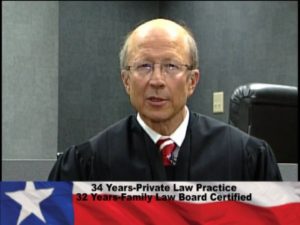Texans love electing officials to public office. Even judges.
We elect them on partisan labels, which I’ve long hated. But in more than 30 years watching judicial races unfold in Texas, it’s rare to find an incumbent judge who’s doing a good job on the bench receive three challengers in a partisan primary contest.
Accordingly, the news that Randall County Court at Law No. 2 Judge Ronnie Walker will forgo a re-election campaign next year shouldn’t come as much of a surprise.
He had three challengers awaiting him next spring. The very idea that Judge Walker would attract such an aggressive primary opposition made me wonder immediately: What has he done to incur this challenge?
We won’t have to answer that question directly as the Republican Party primary campaign for Court at Law No. 2 develops. The challengers won’t have Judge Ronnie Walker to kick around.
If I were still in the daily print journalism game, I would be inclined to ask all the challengers precisely why they chose to run against an incumbent judge. Randall and Potter County political history has revealed to me an extreme reluctance among the local bar association to challenge incumbents who are doing a good — if not great — job in administering justice.
An incumbent generally is doing a bad job on the bench to draw the number of challengers that Ronnie Walker attracted. That’s at least what I’ve noted over many years watching Texas judicial campaigns.
As the Amarillo Globe-News reported: Walker said he would “continue to maintain the high standards and quality of my court” through his term, which ends Dec. 31, 2018.
“I will always appreciate the support and confidence of the people of Randall County who voted me in office beginning Jan. 2, 2007, as the first and only judge of the newly created Randall County Court at Law No. 2,” he wrote in his statement. “Randall County jurors are the greatest, possessing an ideal blend of attentiveness, logic, reasonableness and fairness.”
Still, the question lingers: What — if anything — did this guy do to attract such a vigorous primary challenge?
